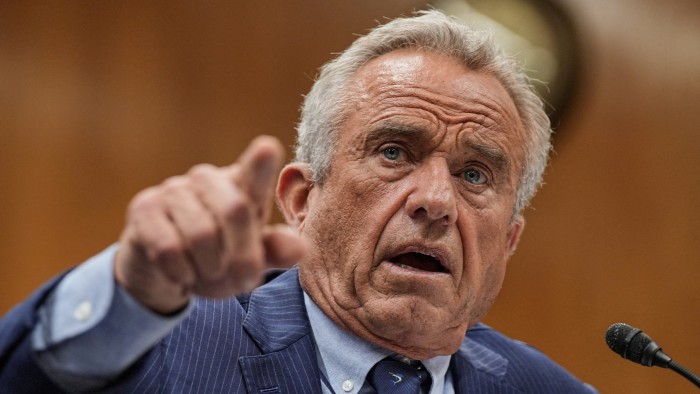Unlock the White House Watch newsletter for free
Your guide to what Trump’s second term means for Washington, business and the world
The Trump administration took aim at “Big Food”, Bayer, Facebook and other companies in its inaugural report on children’s health, which blames poor diet, chemicals and social media for chronic disease in the US.
In a 68-page report published on Thursday, the White House’s “Make America Healthy Again” commission cited potential food, medical and environmental factors that could lead to developmental problems in children. It said that rates of autism spectrum disorder had been rising in the US and now affect one in 31 children by age 8.
“Unlike other administrations, we will not be silenced or intimidated by the corporate lobbyists,” President Donald Trump said at the White House. “In some cases it won’t be nice or pretty, but we have to do it.”
The report stems from an executive order Trump signed in February and reflects the long-standing public concerns of health secretary Robert F Kennedy Jr, ranging from pollutants and ultra-processed foods to sugary drinks and a lack of outdoor playtime.
Companies mentioned in the report footnotes include German-headquartered Bayer, maker of the weedkiller glyphosate, along with other chemical companies BASF, Syngenta and Corteva. The report raised questions about how the scientific study of the health impact of chemicals might be swayed by corporate-funded research.
“Limited comparisons between industry-funded research versus non-industry studies have raised concerns over potential biases in industry-funded research,” the report said.
Publication bias might lead to positive findings in published research, the report said. “Such biases amplify potential discrepancies in the literature and limit the scientific publication of unfavourable results.”
Bayer has faced billions of dollars in litigation over glyphosate. In March, the company lost a jury trial in the US state of Georgia that awarded $2.1bn to a plaintiff. The company has repeatedly cited studies showing glyphosate is safe. And in 2023, glyphosate was reapproved in the EU until 2033.
The report also touches on social media’s potential health consequences for children. The report cited an article about Facebook’s internal findings highlighting body image issues and mental health conditions.
“The pervasive influence of major technology firms on the digital environment of children has prompted significant scrutiny, particularly regarding the alignment of corporate practices with child protection frameworks and the erosion of parental oversight,” the report said.
Additionally, the report cited Kraft while raising concerns about “Big Food” companies and ultra-processed food. “A small number of corporations control a large share of food production,” the report said.
As the Trump administration wages a trade war with a host of trading partners, the report tacitly acknowledged that some countries had better food and medical standards than the US.
In France, for example, the report said dietary guidelines “encourage cooking from scratch” while limiting processed food in favour of “seasonal, local and organic choices”.
In Japan, food guidelines were “rooted in traditional dietary culture” that stressed variety as well as “daily physical activity”.
Read the full article here




